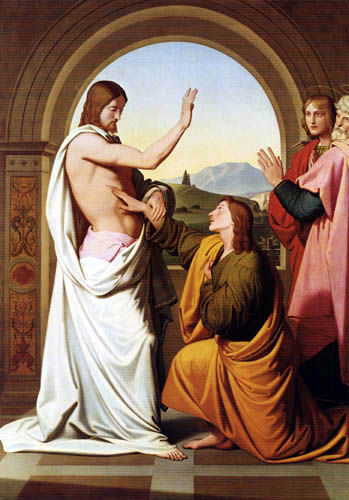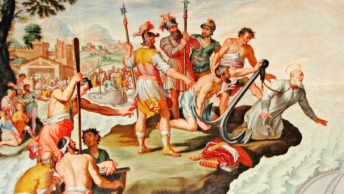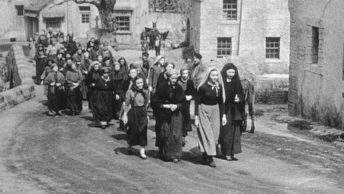 Who among us, myself included, can say we have never felt like Thomas? Or that at times we wonder if the whole death and resurrection accounts of Jesus Christ are merely the stuff of legend? We thirst for certainty. We can feel at times insecure about reports of the Resurrection. The Apostle Thomas heard the report of the entire Apostolic College yet he would not believe Jesus had risen from the dead unless he could touch the nail wounds and thrust his fingers into Christ’s pierced side. We ourselves are in his shoes. We are forced to rely on the reports of those who have seen the Risen Lord, and we want, desperately want, a direct experience of the Jesus who lives. It is one thing to be told about Jesus, it’s quite another to experience Him.
Who among us, myself included, can say we have never felt like Thomas? Or that at times we wonder if the whole death and resurrection accounts of Jesus Christ are merely the stuff of legend? We thirst for certainty. We can feel at times insecure about reports of the Resurrection. The Apostle Thomas heard the report of the entire Apostolic College yet he would not believe Jesus had risen from the dead unless he could touch the nail wounds and thrust his fingers into Christ’s pierced side. We ourselves are in his shoes. We are forced to rely on the reports of those who have seen the Risen Lord, and we want, desperately want, a direct experience of the Jesus who lives. It is one thing to be told about Jesus, it’s quite another to experience Him.
Saul, the Jewish Pharisee who set about persecuting the first Christians, had his own skepticism before he, on his way to Damascus to crush the followers of Christ living there, encountered the Risen Christ. Later, now as St. Paul the Apostle to the Gentiles, he wrote to the Christian Community he had founded in Corinth and addressed those same questions.
Corinth was a seaport town in Greece, a commercial and intellectual center inhabited by very sophisticated people from all around the Mediterranean. They were no fools. St. Paul addressed them with these words taken from his First Epistle to them:
Now I would remind you, brethren, in what terms I preached to you the gospel, which you received, in which you stand, by which you are saved, if you hold it fast–unless you believed in vain. For I delivered to you as of first importance what I also received, that Christ died for our sins in accordance with the scriptures, that he was buried, that he was raised on the third day in accordance with the scriptures, and that he appeared to Cephas, then to the twelve. Then he appeared to more than five hundred brethren at one time, most of whom are still alive, though some have fallen asleep. Then he appeared to James, then to all the apostles. Last of all, as to one untimely born, he appeared also to me. For I am the least of the apostles, unfit to be called an apostle, because I persecuted the church of God. But by the grace of God I am what I am, and his grace toward me was not in vain. On the contrary, I worked harder than any of them, though it was not I, but the grace of God which is with me. Whether then it was I or they, so we preach and so you believed. Now if Christ is preached as raised from the dead, how can some of you say that there is no resurrection of the dead? But if there is no resurrection of the dead, then Christ has not been raised; if Christ has not been raised, then our preaching is in vain and your faith is in vain. (1 Corinthians 15:1-15)
The testimony of eyewitnesses is needed in court trials. It is the evidentiary stuff of necessary proofs. That being so, I want to point out to you today that after His resurrection Jesus appeared twelve times to different groups in sizes ranging from just one person to five hundred people. After His resurrection from the dead His first appearance was to Mary Magdalene and the other women who had come with burial spices to embalm His dead body. Later He encountered two disciples on the road to Emmaus. Later to the disciples who had locked themselves behind closed doors, to seven disciples while they were fishing, and to a crowd of 500 “most of who were alive, St. Paul notes, when he wrote his letter to the Corinthians.
When St. John wrote his gospel, and we must remember that John was as a young man a disciple of Jesus, he concluded his gospel account with these words: But there are also many other things which Jesus did; were every one of them to be written, I suppose that the world itself could not contain the books that would be written.
So as we reflect on today’s Gospel account we need to keep in mind that the Apostle Thomas was a real man. He believed only that which he could touch. He would not allow himself to be played the fool. He was the dupe of no one. He would not settle for illusions. He is a rock, vulnerable to one… the courageous pessimist among those of this world’s philosophers who hold to the notion that life is absurd and that all we can do is endure it and then die. The only reality, they say, is violence and man’s inhumanity toward man. Happiness? Happiness is a fool’s paradise… a pie in the sky promise of Polyannas. The worst will always happen. We’ve all met people who really believe that and whose hearts are help in that icy grip.
To return now to Doubting Thomas, do you remember Thomas when Christ raised Lazarus from the dead? His character was the same back then. A messenger comes to Jesus and says: “Lord, he whom you love is dead.” The disciples of Jesus are concerned about Christ. They know He will want to go to Lazarus. And they know about the political dangers that exist in Judea, dangers to life emanating from powerful persons who hate Jesus. Immediately Thomas, the pessimist, the apostle of the futility of it all, pipes up and declares: “Well, let’s all go and die with Him.”
That was no confession of faith. Rather it was a declaration of despair. Thomas has courage, but only the courage to accept death… not to face life. What makes his character so clear to us, so much our contemporary brother, is the violence of his rejection. I will not believe, he asserts, unless I can see, feel, and experience those wounds in the body of the Risen Lord. His conditions are hard. In his heart what he is saying to Jesus is: “Prove to me that You love me!” That’s hard evidence, a firm stone on which to lay a head filled with pessimism. Haven’t we, he is saying, been exposed often enough to cruel disappointments? Haven’t we often enough become vulnerable, only to be taken in? Why should we believe? After all, if we do then much will be demanded of us. Our freedom to do as we wish will be severely curtailed! Can’t I enjoy life now and forget about any resurrected life?
You and I live in an age of immense suffering and death. We live among men and women who have conditioned themselves to see only one reality, namely death, misery, and terrifying treatment of others. We are conditioned to make only one statement of belief, namely that human love is unreliable and that death is ultimate. Even the causes and the hopes and dreams for which men are willing to die are incredible. We fear being open to hope. Our hopes have been dashed so often. My self is the only reality, and I will not become vulnerable to others, to hope, to love, to the chance of a new life, to belief in others and what they say about life, and about the resurrection of the Lord of life. I am a rock, we say, only that which can be seen, tasted, and touched is real. The only certainty is death. Jesus is a myth.
Yet what could be more of an illusion? What could be more foolish? Not to believe in belief is itself an unproven and unprovable belief. He who says he is free from illusions is usually the one that is most often filled with illusions, anxieties, and unreality.
Thomas suffered for his belief in Christ. So often in his life he had been disappointed! So often his prayers for a Messiah who could free him were answered in strange ways, ways which he could never have expected. So often his expectations about God were turned around by God. To suffer because there is no one in whom we can place our love, and believe in, is in itself the mark of a terribly strong desire to love and to believe! It is THE suffering of our times. It is the form that faith is taking us in our day. It is discretionary, humble, searing, and tragic. But it also very sincere, quite loyal, and it is pure. It is the faith of the new young people of our day and age who so much want to believe.
Out of Christ’s passion, death, and resurrection came the most beautiful and the most convincing act of faith ever recorded in the Bible. Jesus yielded to Doubting Thomas as He yielded to no other member of the College of Apostles. He surrendered in great humility and vulnerability once again. God stoops over and lays Himself down at our side in our troubled waters and bridges the gap. He sees me and He sees you in Thomas. He loves Thomas immensely, and you and me also. He knows our disappointments, our unhappiness, our frustrations, our misery, and our fears and insecurities over being taken in by someone else. Gently He submits to the challenge of Thomas’s doubts, bitterness, and his hard challenge to faith. He comes to the side of Thomas and offers Thomas His own side.
And from out of the heart of Thomas came forth humility and a purgation that touches us 2,000 years later. All of his doubts melt away. Thomas, the hard-as-nails cynic, becomes submissive, yes even intimate, with the Risen Christ. He is lifted to a height that none of the others had attained, except perhaps St. John. Dazzled and overwhelmed Thomas exclaims: My Lord, and my God! He becomes the first of the Apostles to carry his love and belief that far. No other Apostle had ever referred to Jesus as “My God!” From this poor and pessimistic Thomas, violent in his unbelief, Jesus drew the statement of belief that He had spent His entire life preparing for! From Thomas came the fulfillment of Christmas, the expectations of Mary, and the response God wants from us. From the dregs of human suffering, despair, disappointment and disbelief comes the cry of man ravished by the love of the God who became part of all that it means to be human. From the heart of a doubting and rebellious man comes the response that a yearning God who is a Lover has always looked for. Nothing has so influenced our God as the thoughts festering in the heart of Thomas and in your heart and mine as well.
All that remains is our surrender, our willingness to believe, our acceptance of the Risen Lord, and our communion of love. All that remains is our surrender to our Divine Lover and give Him the cry from our hearts: “My Lord, and my God!” With that we can go to the sides of all who live in the darkness of doubt and disbelief.








